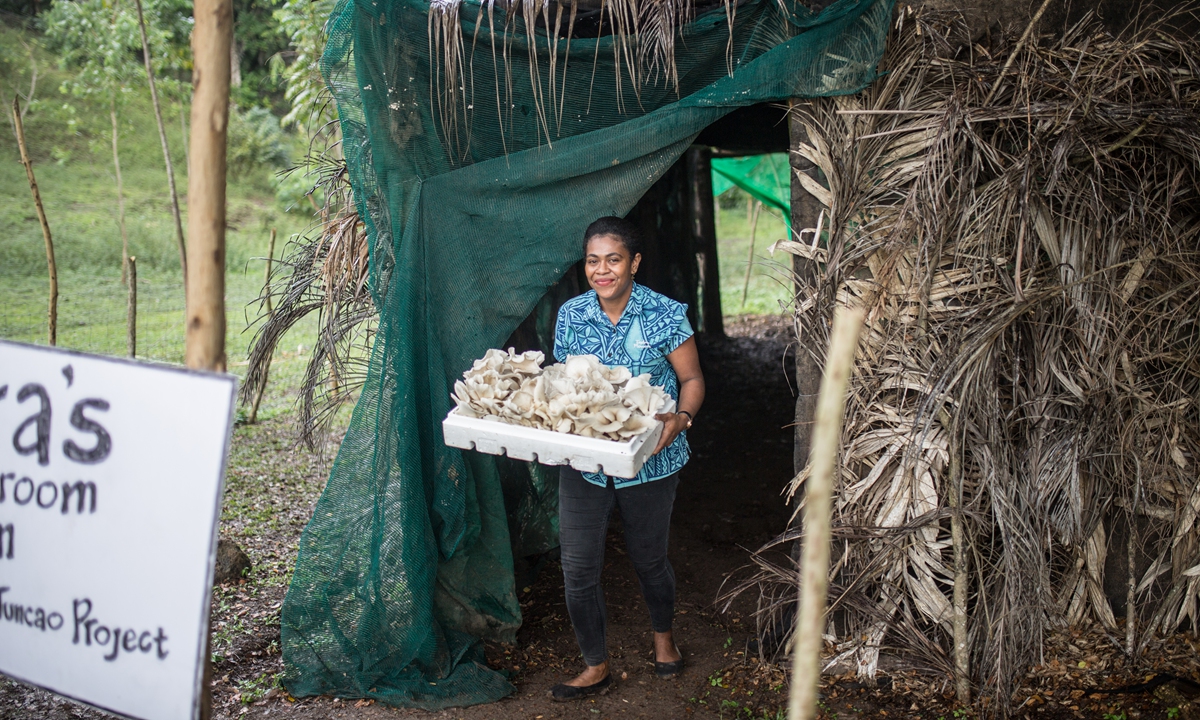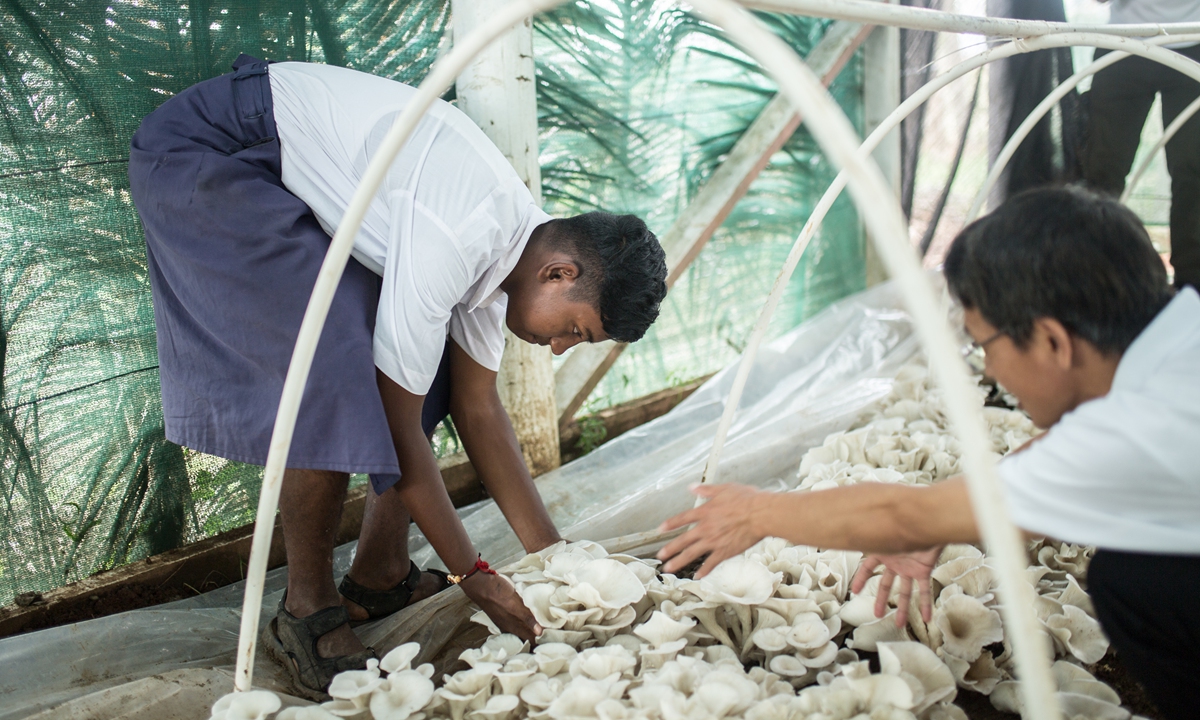
A local woman carries mushroom at the Tadra farm in Nadi, Fiji, on August 17, 2023. Photo: Shan Jie/GT
Editor's Note:Since 2012, China has witnessed an extraordinary economic transition, with historic achievements in all aspects of the economy from its size to quality. Such an unparalleled feat does not just happen, especially during a tumultuous period in the global geo-economic landscape and a tough phase in China's economic transformation and upgrading process. It was Xi Jinping Thought on Socialism with Chinese Characteristics for a New Era that guided the country in overcoming various risks and challenges, and in keeping the China economic miracle alive.
As China embarked on the quest to become a great modern socialist country amid global changes unseen in a century, Xi's economic thought has been and will continue to be the guiding principle for development in China for years to come, and have great significance for the world. What is Xi's economic thought? What does it mean for China and the world? To answer these questions, the Global Times has launched this special coverage on Xi's major economic speeches and policies, and how they are put into practice to boost development in China and around the world.
In China's decades-long efforts targeting poverty reduction, the largest such undertaking in modern history, numerous figures and stories have emerged. Among them, the seemingly unassuming Juncao, a particular breed of grass, has played a pivotal role, adding a vibrant and indispensable chapter to the pursuit.
While absolute poverty has been eradicated in China, the grass species which was first introduced to the world by Chinese President Xi Jinping to the world in 2000, is now flourishing, vigorously growing in even more developing nations and beyond, and dubbed as a "magic grass" in helping locals to live better lives.
Juncao, which literally means "mushroom" and "grass," can be used, as its name suggests, to grow edible mushrooms, as livestock feed or as a green barrier to stop desertification. It is a patented Chinese project, simple to operate and profitable.
In the quest to discover the value of Juncao, the Global Times visited Fiji, and found that significance of the grass has long transcended its own nature, becoming a "magical grass" that promotes ecological protection, increases locals' life, improves women's income and advances sustainable development for the island nation and beyond.
Grass of happiness
A Chinese expert (right) demonstrates to a Fijian student how to harvest a ripe mushroom at the Votualevu College in Nadi, Fiji, on August 17, 2023. Photo: Shan Jie/GT

A Chinese expert (right) demonstrates to a Fijian student how to harvest a ripe mushroom at the Votualevu College in Nadi, Fiji, on August 17, 2023. Photo: Shan Jie/GT
"This Juncao grass is really, really helpful to us, thank you China," Neori Tiko, a worker at the Tadra farm in Nadi, told the Global Times.
Tiko introduced that the farm has started to develop Juncao technology at 2020, and during that time, facing severe drought, there was hardly any grass left. "So we got introduced by the 'Juncao guys' from China and started to plant them. From then till now, we use it as feeds for the horses, for mushroom production and are planning for planting more."
The "Juncao guys" referenced by Tiko are a group of Chinese experts working for the Juncao technology demonstration center in Fiji. The project, kicked off in September 2014, was personally endorsed by President Xi and jointly approved by leaders of the two countries.
Lin Xingsheng, currently serves as the leader of the expert group, told the Global Times that Juncao technology covers a wide range of applications and offers extensive opportunities for the development of the Juncao industry chain in the island nation.
Juncao can serve as a substrate for cultivating edible and medicinal fungi. Additionally, it can be used as an effective feed for livestock like cattle and sheep, addressing the issue of feed shortage during the dry season in the drought-prone areas of western Fiji and promoting local livestock development, Lin said.
Furthermore, Lin outlined that Juncao exhibits rapid growth and a well-developed root system, making it useful for addressing local issues such as soil erosion and soil salinity in addition to its other benefits.
Since the implementation of the cooperation project of Juncao technology in Fiji in 2014, the Juncao technology demonstration center in Fiji has become the largest of its kind in the Pacific, with more than 600 local farmer households participating in the growing of Juncao, and more than 1,000 households benefiting from the total planting area of over 7,000 mu (466.6 hectare), Tang Wenhong, vice-chairman of the China International Development Cooperation Agency, said in March this year.
Across the globe, since China established its first overseas Juncao technology demonstration base in Papua New Guinea (PNG) in 2001, the Juncao technology has so far benefited 106 countries and regions by addressing poverty, soil erosion and desertification.
According to Chinese Foreign Ministry, the Juncao technology has been promoted in 15 languages. Over 10,000 people have been trained globally in cultivating the grass. Thirteen Asian, African and Pacific countries have established training and demonstration centers of the technology.
The wider application of Juncao technology in the world is seen as a vivid display of Xi's economic philosophy, as the seemly small but valuable herb has offered China's solutions to global challenges, nation's commitment to foreign aid as well as its concern for the greater good of humanity with an ambitious goal of "no one will be left behind" in the global development.
"I have long cared about the international cooperation of Juncao technology," President Xi said in a congratulatory letter to the Forum on the 20th Anniversary of Juncao Assistance and Sustainable Development Cooperation in 2021.
Xi emphasized that China is willing to work with relevant parties to continue to contribute China's wisdom and China's solutions to the implementation of the United Nations 2030 Agenda for Sustainable Development and make Juncao technology a "grass of happiness" that benefits people in developing countries.
The message has been reiterated by Xi at the First High-Level Conference of the Forum on Global Action for Shared Development in July this year.
Development is the eternal theme of human society, and shared development is an important path to building a better world. As the largest developing country, China has always placed its own development within the larger context of human development and created new opportunities for the development of the world through its own development, Xi said in a congratulatory letter sent to the form.
China will further increase its allocation of resources for global development cooperation, work with the international community to continuously deepen and substantiate the Global Development Initiative, and make new contributions to realizing the UN 2030 Sustainable Development Goals as scheduled and promoting the building of a community with a shared future for mankind, Xi said.


